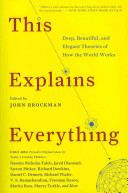As an update to this post, I refer you to Thomas Friedman’s September 13, 2017 NYT column, Trump’s Folly. For me this is similar because Friedman explains, if we prepare for climate change, make the wager we are prepared if it does happen and if it does not happen, “…we will be left healthier, stronger, more productive, more resilient and more respected around the world.”
In the 1660’s mathematician Blaise Pascal created a logic puzzle about a wager related to the question of whether or not to believe in God. He used it as a logic exercise because there is no reason or science that can provide a definitive answer. Tim O’Reilly, CEO of O’Reilly media, described Pascal’s original Wager in John Brockton’s book, “This Explains Everything: Deep Beautiful and Elegant Theories of How the World Works”, in this way:
You must wager. It is not optional. You are embarked. Which will you choose then?…You have two things to lose, the true and the good; and two things to stake, your reason and your will, your knowledge and your happiness; and your nature has two things to shun, error and misery. Your reason is no more shocked in choosing one rather than the other, since you must of necessity choose. This is one point settled. But your happiness? Let us weigh the gain and the loss in wagering that God is. Let us estimate these two chances. If you gain, you gain all; if you lose, you lose nothing. Wager then, without hesitation that He is.
It should be understood that Pascal’s argument for faith rested on self-interest. In describing the wager, it was explained that today’s wager we must make or face dire consequences relates to climate change. It also needs to be understood that in reality we have caused climate destabilization, not just warming. The warming triggers a devastating cascade of issues related to survival of humans.
Climate Change, unlike with God’s existence, does provide some reason and science which to many if not most scientists provides a definitive answer. As outlined, the author explains that if we wager that climate change is real we will then:
- Develop renewable energy sources
- Create an industry and jobs to support and supply clean energy
- Direct tax dollars from highways/car to support of clean public transportation
- etc…
RESULT: More robust economy!
These actions would also increase national security by lessening our reliance on hostile nations for oil. Also as described by Patrick Kennedy, (see here and here for presentations) a move to clean energy would democratize energy because it would mean we all could all have power, roof solar panels, and then people would not be reliant on energy companies. If people provide their own power this would extinguish much of the influence power companies now exert and have.
Making the wager that climate change is happening, despite some debatable proof, means we will be practicing paneugenesis. To practice paneugenesis means we will be moved to generate comprehensive improvements by creating interactions so everyone and everything benefits. What is the downside to not making this wager? We must remember, certainty about the consequences of Climate Change will only come after all the bets are called in.
Of course thinking about this from the other perspective, what are the benefits of not believing in climate change? Not believing would move us to take actions to protect and maintain the status quo. While this can be done, what happens if we are wrong? Pascal’s wager rests on self-interest.
“The riskiest thing we can do is maintain the status quo.” – Bob Iger
Alice Bows-Larkin, in her TED Presentation, “Climate Changes is happening. Here’s how we adapt,” makes a case for why this is a wager we have to make now, and we cannot wait.
Logic and facts suggest it is a Wager we Cannot Afford to Not Make. To support making this wager, Mary Robinson, former President of Ireland (1990-1997), provides a great supporting perspective. In her TED Presentation, “Why Climate Change is a Threat to Human Rights”, she talks about these issues based on her experiences as a leader. I encourage you to watch:
Craig Becker
Be selfish, selfless, & synergistic so everyone and everything benefits!



6 thoughts on “2017 Update: Today’s Pascal’s Wager, One We Must Make!”